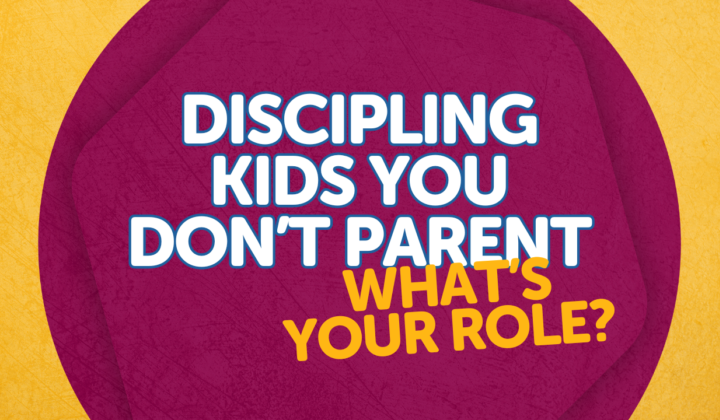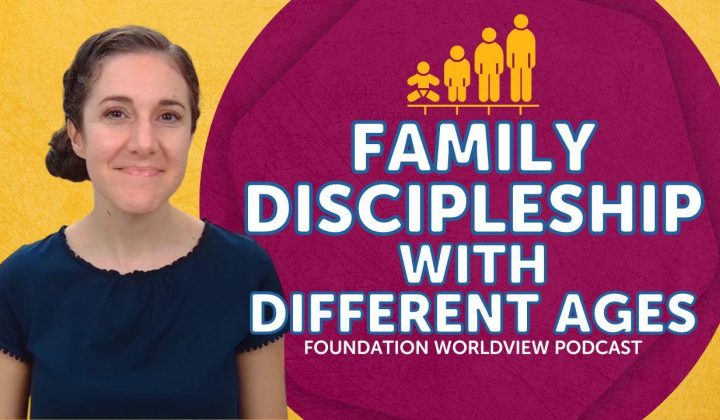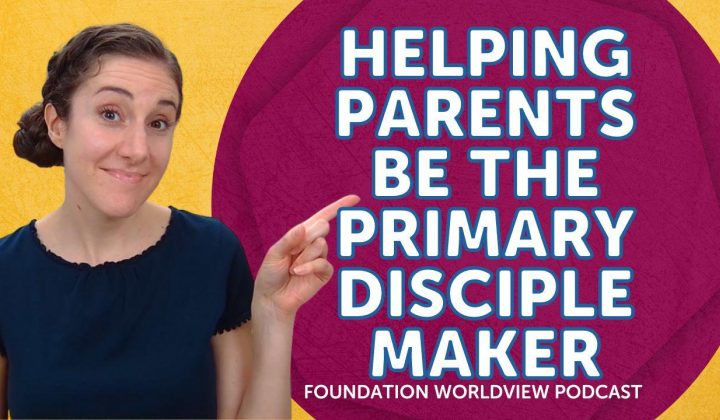Learn more about the journey that led to us equipping kids to carefully evaluate every idea they encounter.
Meet members of our team who have contributed to curriculum development.
Hear from real users of the Foundation Curriculum.
Learn what we believe about God, Jesus, Scripture, and more.
Discipling Children Without Treating Them Like Projects
In this episode, Elizabeth Urbanowicz explores how we disciple children faithfully without making them feel like projects. Elizabeth shares practical steps to focus on holistic discipleship that engages kids’ heads, hearts, and hands, and emphasizes the importance of building strong relationships. Tune in for actionable insights on guiding children toward Christ with love and respect.
Transcript
Note: The following is an auto-transcript of the podcast recording.
Hello, friends. Today's podcast question says, "where does one draw the line between discipling children and treating them like projects?" This is an important question, and it is one that I can empathize with. Those of you who are faithful Foundation Worldview podcast listeners know that I do not have children of my own, but I am very type A and extremely goal oriented. So I have struggled this in my relationships with my students in my classroom back when I was a teacher, and even in discipleship relationships at church, that I tend to excel in the teaching part, but I need to get better at working on simply building relationships and enjoying the children that God has placed in my care. So today on the Foundation Worldview Podcast, we're going to dive down deep into this question of how do we disciple children faithfully without treating them like projects. So that's what we're going to cover today on the Foundation Worldview Podcast where we seek to answer your questions so that you can equip the children that God has placed in your care to carefully evaluate every idea they encounter and understand the truth of the biblical worldview.
Now, as I just said before, this is a question that I can deeply empathize with and it resonates with me. So I'm going to offer some just general suggestions for anyone who struggles with this, for anyone who struggles with viewing children, the children in your care, whether they're your own children or children in a classroom or a church with treating them more like projects and focusing so much on discipleship that you just forget about relationship building, which is also a huge part of discipleship.
So just my first suggestion would to be intentional at discipling a child's head, heart, and hands. Those of you who have gone through the Foundation Worldview Parenting series, you know that in the entire first lesson of that series, we cover what it looks like to disciple the head, to disciple the heart, and to disciple the hands. And I think when we focus on this holistic discipleship, we start to view our children as whole people, and we don't run into this error so much of viewing them simply as projects. So if you would like more information about discipling the head, the heart, and the hands, highly recommend you check out our parenting series. You can watch the first lesson that focuses on head, heart, and hands for free at FoundationWorldview.com. So highly recommend you go and check that out because it's an hour long teaching.
But just really briefly, when we're talking about discipling the head, we're talking about training children to think well and to reason well. And this is what we at Foundation Worldview, what we mostly focus on is equipping you with resources to disciple the children. God is placed in your care through thinking, training them to think well. So we need to train our kids to evaluate ideas. We need to train them how to read Scripture. We need to train them how to think critically through everything that they're going to encounter. So this is discipleship of the head.
We also need to focus on discipleship of the heart and the heart is the part of discipleship that involves relationships. So actually getting to know these children, letting them get to know us, enjoying one another, just developing healthy Christ-centered relationships where there's confession of sin and repentance and forgiveness and continual growing and fostering of relationships.
Then discipleship of the hands involves the rhythms and routines that we have in place in our homes, in our churches, and our schools. Actual daily reading of Scripture, taking time to serve others, taking time to pray together, taking time to make sure that we are thinking through the things of God all throughout the day, the different rhythms and routines that we've had in place. And I think that when we focus on this holistic discipleship of the head, the heart, and the hands, we are in a much safer place of not viewing our children as projects, but actually viewing them as whole people that God has entrusted to us. That would be my first recommendation.
My second recommendation is to spend time enjoying your children. That yes, you have goals for them. Yes, you have different desires that you want to see come to fruition, and you also just need to enjoy your children. Now, some of you watching and listening, you may not have any problem with this. Your problem might actually be the opposite, that you spend so much time enjoying your children, you're not actually intentional at guiding them and shepherding them so you know your personality. So if you're more one that's focused on enjoying your children and you need to get better at actually guiding them, that's what the most of the rest of the Foundation Worldview podcasts are for. So go check those out. But if you struggle more like this questioner and like me with being very type A and goal oriented, make sure you spend time enjoying your children. Part of this is because God delights in his children. Have you ever thought about that before? That God delights in you? God has no need for you. Everything that God is doing in and through you, he could do with someone else. He has no need of you. He does not need you, but he delights in you. He longs to be with you and spend time with you. That's why God sent Jesus. He actually longs to be with his children. And we should reflect that heart of God in a similar desire with our children, that we're not just seeking to guide and mold them, but we're also enjoying them. And this requires time. It means that if we don't have any time where we can just spend enjoying our children, where we can play together, where we can do something that they would enjoy together, that we need to make sure that we're intentional at carving out that time.
Now, as I mentioned at the beginning of this podcast, I don't have any children of my own. But when I was a teacher in the classroom, this is something that I found so valuable in my teaching years, that for the most of the school day, I had specific goals for my students that we had to get through this math lesson so that they could learn skills, A, B, and C, that we had to get through this part of the reading curriculum so that they could develop their reading skills further. I had goals all throughout the day, but when it came time for recess, now, I wasn't always faithful about this, but I tried really hard during recess times. The recess times that I monitored to just play with my students and they loved it, I would actually go and swing on the swing set with them, and we'd have swinging competitions to see who could go the highest, the fastest. We would play on the monkey bars. We would go down the slides. Sometimes we'd play tag or we'd play some other games. Or sometimes if I had a child that didn't really like to play games, I would spend time walking laps with them around the playground and talking with them and getting to know them. But I found this to be so valuable and actually delighting in the students that God had placed in my care, and to let them know that I delighted in them and that I cared about them and that I wanted to spend time with them.
My third recommendation would be to be very careful about balancing both discipline and grace. That we need to be faithful at disciplining our children and being gracious with them. Now, children in our homes, in our classrooms, in our churches, we do need to require that they live according to biblical standards, that they're treating one another with love and respect, that they're being obedient to the adults in authority over them. If you're a parent, your children also need to be obedient to the household rules that you have set up. For example, if their bedtime is at 7:30 or 8:30, whenever it is that you have established as a healthy bedtime for them, Scripture doesn't say that they need to go to bed at a certain time, but it does tell children to obey their parents. So they need to obey the household rules. And so we need to be faithful at requiring them to live according to the biblical standard and disciplining them when they don't. But we need to understand that they are going to struggle. We are going to give our children directions, and there's going to be times when they're going to choose not to follow them. We have to discipline them, and that we have to know that this is going to happen. There are going to be times where we're going to give our children directions, and they're not going to remember them. They're going to forget them. And in these situations, yes, we still need to discipline our children. God disciplines his children. It tells us in the New Testament that God disciplines those He loves. That discipline is what actually proves that we are children of God because God disciplines his children. So we need to be consistent in discipline and also consistent in grace and knowing, you know what? I'm frustrated. I'm angry. I just want my child to do what they're supposed to do. But I understand that they're a sinner. God is still working on them. And so I need to be patient with them. I need to have grace toward them.
And then my fourth and final recommendation would be to pray, to pray for them. Pray for your children. Pray that they would come to know and love and trust Jesus. Pray that God would grow their love for him every year. Pray that they would be faithful to obey God, that they would delight in the law of the Lord and that they would be satisfied in him alone. Pray for wisdom for yourself. You don't know every situation that you're going to encounter each day or week or month, or year, and you're going to need the Holy Spirit's wisdom in those situations. So pray that God would give you wisdom and how to disciple these children well. Pray for quick conviction of the Holy Spirit when you sin against them. Pray that the Holy Spirit would convict you quickly so that you can confess and repent of that sin and reconcile that relationship with them. Pray that your child, your children will be convicted quickly when they sin, so that they can turn and repent, that they could come back to Jesus. They could have a reconciled relationship with you and those they sinned against. And pray that you would trust the Lord in each situation and that you would moment by moment, walk by faith and not by sight, because God is the one who gives wisdom. So this would be my recommendation for anyone who like me, is type A and very goal and oriented. Be intentional at discipling your children in the head, the heart, and the hands. Spend time enjoying them, balance, discipline and grace and pray for them.
Well, that's a wrap for this episode. But if you have a question that you would like for me to answer on a future Foundation Worldview podcast, you could submit that by going to FoundationWorldview.com/podcast. My prayer for you as we leave this time together is that no matter the situation which you and the children God has placed in your care, find yourselves that you would trust that God is working all things together for your good by using all things to into the image of His Son. I'll see you next time.
Related Posts and insights

Discipling Kids You Don't Parent: What's Your Role?
In this episode, we explore how to guide children spiritually when you're not their parent. Whether you're an aunt, uncle, or church member, learn how to influence kids' faith while respecting parents' authority and maintaining your God-given role. Discover ways to build relationships, pray intentionally, and offer wisdom when invited.

Family Discipleship with Different Ages
Trying to incorporate family discipleship or family worship in your home? Today's question says, "how would you recommend family discipleship with an age difference between kids?" In this episode, Elizabeth Urbanowicz provides insights and strategies on how to best approach family discipleship in a home with children who vary in age.

Helping Parents be the Primary Disciple Maker
How do we help parents be equipped to disciple the children in their care? In this episode, Elizabeth Urbanowicz, speaks to parents and church ministry leaders about how we can help parents see the need to be the primary disciple makers to their children, and how this can be modeled for other parents.




